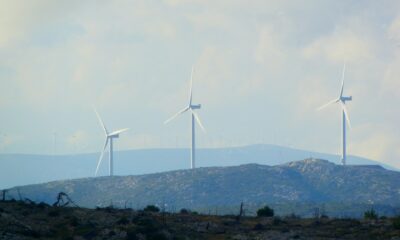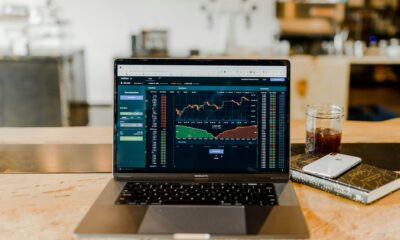Featured
Can Investments in Defense Stocks Be Sustainable?
Those who rate defense investments as ESG compliant argue that the defense sector plays an important role in protecting civilians as geopolitical tensions rise. Meanwhile, the European Commission continues to work on a taxonomy for sustainable investments, and arms companies are seeking to be included in that category as well. Some fund issuers have changed their stance in light of the war in Ukraine.

The Ukraine war poses a major dilemma for fund managers. Can investments in shares of defense companies and arms manufacturers meet ESG criteria?
In recent years, the debate about which investments are sustainable and which are not has gained significant momentum. So far, the main issue has been how to achieve climate goals, and whether or not the use of gas or nuclear power, for example, as transitional technologies will help in this regard?
However, Russia’s attack on Ukraine has sparked a completely new ESG discussion. “I would worry about the arms industry creeping in through the back door,” said Hendrik du Toit, managing director of Ninety One Asset Management, in an article published by the U.K. industry platform Financial News.
Read more on the subject and find the latest finance news in the world with the Born2Invest mobile app.
Role in protecting civilians
Those who rate defense stocks investments as ESG compliant argue that the defense sector plays an important role in protecting civilians as geopolitical tensions rise. “The question now is whether security is a commons that ESG portfolios can and should invest in. In my view, security is a commons,” said Euan Munro, managing director of Newton Investment Management.
“While I fully agree that every nation has the right to defend itself,” said Amanda Young, chief sustainability officer at UK fund manager Abrdn. “But the use of weapons against civilians and the indiscriminate casualties of certain weapons have massive consequences. Until there is a guarantee that weapons will be passed on to less democratic states, they cannot be considered ESG compliant.”
Change of heart among some asset managers
Meanwhile, the European Commission continues to work on a taxonomy for sustainable investments, and arms companies are seeking to be included in that category as well.
Some fund issuers have changed their stance in light of the war in Ukraine. While some exclude only manufacturers of weapons such as cluster bombs, others have weeded out the entire industry.
Swedish group SEB opened up investments in the sector to some of its funds last March, lifting a blanket ban introduced in February 2021.
Defense as a necessity
Even banks have come out in favor of classifying defense stocks as sustainable investments. “Defense is likely to be increasingly viewed as a necessity that facilitates ESG as a business, as well as the maintenance of peace, stability, and other social goods,” reads a Citigroup analyst note.
The note refers to Germany’s planned increase in defense spending. And the country “is unlikely to be the only European nation to increase its defense spending,” it said. “Given recent events, we reiterate our view that the market will reconsider the ESG rating of the defense industry,” the Citi analysts said.
Sticking to restrictions
Asset manager Federated Hermes does not plan to change its approach to defense stocks.
“We have always had, and will continue to have, a firm-wide restriction on companies that derive revenue from the production of weapons prohibited by international law or recognized international conventions,” said Leon Kamhi, head of responsibility. “Any involvement in the production of these weapons or a critical role in their production will result in exclusion.”
__
(Featured image by Rohitvarma via Pixabay)
DISCLAIMER: This article was written by a third party contributor and does not reflect the opinion of Born2Invest, its management, staff or its associates. Please review our disclaimer for more information.
This article may include forward-looking statements. These forward-looking statements generally are identified by the words “believe,” “project,” “estimate,” “become,” “plan,” “will,” and similar expressions. These forward-looking statements involve known and unknown risks as well as uncertainties, including those discussed in the following cautionary statements and elsewhere in this article and on this site. Although the Company may believe that its expectations are based on reasonable assumptions, the actual results that the Company may achieve may differ materially from any forward-looking statements, which reflect the opinions of the management of the Company only as of the date hereof. Additionally, please make sure to read these important disclosures.
First published in finews.ch, a third-party contributor translated and adapted the article from the original. In case of discrepancy, the original will prevail.
Although we made reasonable efforts to provide accurate translations, some parts may be incorrect. Born2Invest assumes no responsibility for errors, omissions or ambiguities in the translations provided on this website. Any person or entity relying on translated content does so at their own risk. Born2Invest is not responsible for losses caused by such reliance on the accuracy or reliability of translated information. If you wish to report an error or inaccuracy in the translation, we encourage you to contact us.

-

 Fintech1 week ago
Fintech1 week agoSwissHacks 2026 to Launch Inaugural Swiss FinTech Week in Zurich
-

 Cannabis5 days ago
Cannabis5 days agoColombia Moves to Finalize Medicinal Cannabis Regulations by March
-

 Crowdfunding2 weeks ago
Crowdfunding2 weeks agoReal Estate Crowdfunding in Mexico: High Returns, Heavy Regulation, and Tax Inequality
-

 Cannabis1 week ago
Cannabis1 week agoSouth Africa Proposes Liberal Cannabis Regulations with Expungement for Past Convictions

























